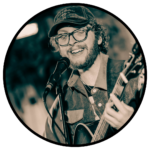BY: LIAM PENDERGRASS
For most professional musicians, a music school degree is an obvious and ideal path toward working in the field they love. Specialized courses and private instruction mold students into industry-ready players, producers, composers, song writers, audio engineers, and business people. As a student, busy rehearsal schedules and courseloads mean there are opportunities in music at every turn. But then, nearly overnight, graduation day has passed. And for many, a full plate becomes a clean slate. Each musician faces unique challenges after graduating from music college and the opportunity to mold a work-life unique to their musical strengths, interests, and goals.

So What Can You Do With A Music Degree?
My name is Liam Pendergrass, and I am a touring guitarist, bassist, and solo artist from North Carolina. I also work as a private instructor with both in-person and remote students and as a writer and researcher for Inside Music Schools. In this blog, I will give an overview of the choices I made as an undergraduate and as a newly graduated music student in an attempt to share ideas that may help ease the uncertainty after diplomas have been awarded.
My Personal Story About Starting a Music Career
Finding Opportunities at a Small Liberal Arts College
As a student at Catawba College, a small liberal arts college in Salisbury, North Carolina, I was a double major in Music Business and Popular Music. I chose this educational path with the hopes of performing and working in a music industry role. Before and during my time in music school, I had regular gigs with various groups, and by my senior year, I was booking my soul/funk trio “Liam & The Nerdy Blues” at music festivals, venues, and community events throughout the state.
During school, I performed and studied primarily as a bassist. Being in a smaller music program gave me ample opportunity to be in ensembles with a variety of musicians on campus and gain performance-ready skills. One of these groups was overseen by a professional gospel musician, named Dennis Reed, (recently featured on America’s Got Talent) who worked as a church music director. Through Dennis, I was offered a position as a bassist for a weekly Sunday service, which gave me consistent performance work and sharpened my playing abilities.
Networking During Music School
Being in a small Southern city also allowed me to network with other professional musicians, learn about new musical happenings, and find numerous recording and performance opportunities. Showing initiative and taking advantage of the ensemble opportunities presented to me in school set me on the road to my career path.
While I took time to build my performance skills, I also volunteered with student ensembles at my college and was later asked to join the faculty as an adjunct instructor, which gave me my first professional teaching experience. This experience further broadened my network and led me to Steve Lipman at Inside Music Schools (IMS), who needed an extra hand with administrative tasks. Working with IMS allowed me to have the flexible schedule a gigging musician needs, and my role with IMS continues to grow to this day.
These school experiences taught me that building connections with other budding music professionals, local musicians, and faculty can make a real impact on post-graduation success. Showing support and initiative when it matters can be equally as important as mastering a concept on an instrument.
Networking as a Professional Musician
I graduated in 2018 wanting to pursue a career in live performance. I knew that it would take some time to build into a financially sustainable one. My education in Music Business provided a good amount of preparation for what I’d face in the professional world as a gigging musician and I needed to be creative to fill the spaces in my schedule while I grew as a performer.
Finding opportunities to perform felt like the most urgent task after graduation. Having the steady church gig was helpful, but I wanted to play in the local scene, build a network, and grow as a musician and a “brand”. I prepared a press kit to highlight my experience performing at local venues and with my own band. Once I had something professional to present, I began to research the music scenes in surrounding areas on social media and contact people I’d met in various musical settings to find venues, community events, radio shows, and any other opportunities. Staying busy as a gigging musician, coupled with a steady online presence, eventually led to serious opportunities for me both as a solo artist and with my band.
As musicians in the scene began to see me perform, I was approached by many to play with their group or record on their next project. During COVID, I tapped into my creativity to find opportunities to perform and network with musicians. I created an online show called “Liam P’s Virtual Variety Broadcast”, on which I shared performance videos and interviews with other regional musicians. Through this, I met an artist based in Raleigh named Acisse Jay, with whom I’ve played a festival gig and a Sofar Session and will be performing on her live album this year.
I’ve had the privilege to do quite a bit of touring with a band named “Swim in the Wild”, at large festivals and as a solo artist. I planned these gigs in the same way I booked my first shows after college; utilizing my network and researching the music scenes in various areas, and ultimately sending out an updated version of that same electronic press kit. Research and networking can go far during school and after graduating, regardless of your path in the industry.
What Music as a Career Looks Like For Me
Though I am far from a celebrity musician, I have been able to find many great opportunities as a performer. My work as a private instructor and writer has given me the flexibility to do so. Being a self-employed musician has required a large amount of creativity, open-mindedness, and trial and error to find a combination of work and performance that is sustainable and productive.
Moving into any new stage of your career will bring uncertainty, but your time as a student is meant to prepare you to handle that uncertainty as a professional. If you work hard and believe in your talents, you can use the tools you gather with your diploma courageously, and find the opportunities that best fit your musical and professional goals.
Music Industry Career Counseling to Guide Your Career Path
Take the first steps today toward eliminating the uncertainty from the music career and school selection process. At Inside Music Schools, we believe every music student should have the guidance they need when choosing their music career path and getting into a top school of their choice. For 15 years, we’ve helped hundreds of parents and students by providing music industry career counseling along with admissions counseling. With our knowledge of universities, conservatories, their faculty, and music programs, we’re able to recommend the right schools and improve students’ probability of success. Talk to us to start building your music school network.

Liam Pendergrass
Liam Pendergrass is a professional multi-instrumentalist, singer-songwriter, and educator from central North Carolina. He currently performs as a touring solo artist, band leader for blues/funk trio “Liam & The Nerdy Blues”, and lead guitarist for indie rock band “Swim in the Wild.” Liam is a Catawba College alumni and former adjunct that has performed and recorded with many noteworthy musicians during his career. Aside from performance, Liam specializes in private guitar, bass, and music theory instruction and works as a writer and researcher for Inside Music Schools.
